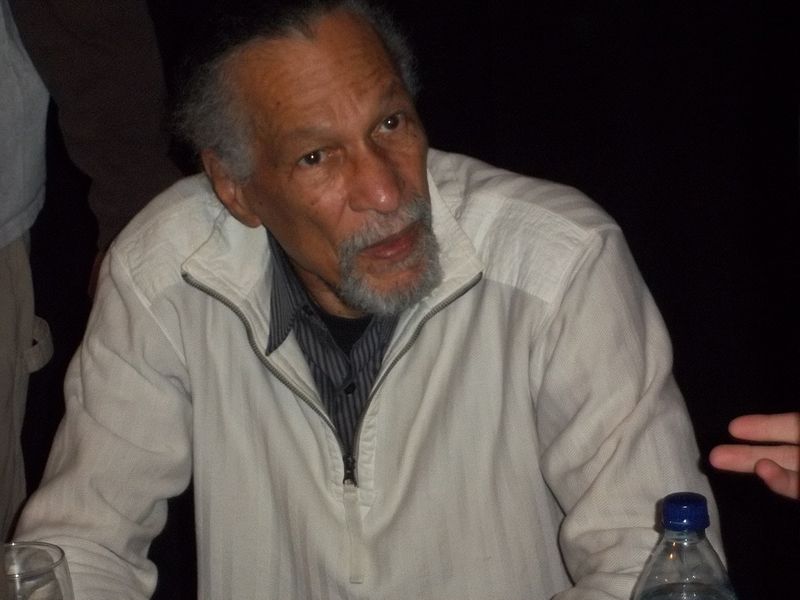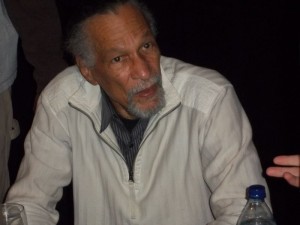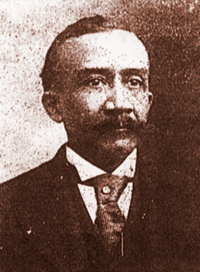
James Edward Maceo West (born February 10, 1931 in Farmville, Prince Edward County, Virginia) is an American inventor and acoustician. Along with Gerhard Sessler, West developed the foil electret microphone in 1962 while developing instruments for human hearing research. Nearly 90 percent of the more than two billion microphones produced annually are based on the principles of the foil-electret and are used in everyday items such as telephones, camcorders, and audio recording devices among others. West received a BS in Physics from Temple University in 1957. He holds over 250 foreign and U.S. patents for the production and design of microphones and techniques for creating polymer foil electrets.
In addition to his many contributions to acoustical science, throughout his career West has been a fervent advocate for greater diversity in the fields of science and technology. While at Bell Laboratories, West co-founded the Association of Black Laboratory Employees (ABLE), an organization formed to “address placement and promotional concerns of Black Bell Laboratories employees.” He was also instrumental in the creation and development of both the Corporate Research Fellowship Program (CRFP) for graduate students pursuing terminal degrees in the sciences, as well as the Summer Research Program, which together provided opportunities for over 500 non-white graduate students.
Dr. West is the recipient of the National Medal of Technology and Innovation, and in 2010, along with Gerhard M. Sessler, West was the recipient of The Franklin Institute’s Benjamin Franklin Medal in Electrical Engineering. He is also an inductee to the National Inventors Hall of Fame and an elected member of the National Academy of Engineering. He is also the recipient of numerous other honors and awards. However, West feels that his greatest accomplishments are his four children Melanie, Laurie, James and Ellington.
Samuel Raymond Scottron (February 1841 – October 14, 1908) was a prominent African-American inventor from Brooklyn, N.Y. who began his career as a barber. He was born in Philadelphia in 1841. He received his engineering degree from Cooper Union in 1878.
He was a community leader in New York, setting up organizations to promote racial harmony and fairness, as well as a public speaker and writer on race relations. He was a member of the Brooklyn board of education, and a leader in the Republican Party. He fought for the end of slavery in Cuba and Puerto Rico.
He invented a special mirror bracket which allowed you to see yourself as others see you. He went on to receive 4 more patents.
Here are his inventions and patent numbers.
- 1880-02-17, #224,732, Adjustable window cornice
- 1883-01-16, #270,851, Cornice
- 1886-09-21, #349,525, Pole tip
- 1892-08-30, #481,720, Curtain rod
- 1893-09-12, #505,008, Supporting bracket
Samuel Scottron moved with his family to New York City when he was a child, where he completed grammar school. During the American Civil War, he was the sutler for the 3rd United States Colored Infantry and almost went bankrupt. To recoup his fortunes, he first operated grocery stores in Fernandina and Jacksonville, Florida, and then a barber shop in Springfield, Massachusetts. It was there that he developed and patented his first invention, the adjustable window cornice. Moving to Brooklyn, New York, he worked as a traveling salesman for an import-export business located in lower Manhattan while continuing to patent his inventions and, by the late 1880s, was able to support himself and his family by manufacturing the products derived from his patents. His company, the Scottron Manufacturing Company, was located at 98 Monroe Street in Brooklyn.
Samuel Scottron married Anna Maria Willett, a native New Yorker, in 1863; they would have five children.
He died in Brooklyn on October 14, 1908.
His grandson, Charles Scottron, played for the Smart Set Athletic Club basketball team, one of the Black Fives teams, which were basketball leagues in the period between 1900 and 1940, when racial segregation was institutionalized, in which African-American players in New York, Washington, D.C., Chicago and Pittsburgh, and later other cities, engaged in community-based and inter-city leagues and rivalries.
Scottron was the maternal grandfather of noted singer Lena Horne (1917–2010).


